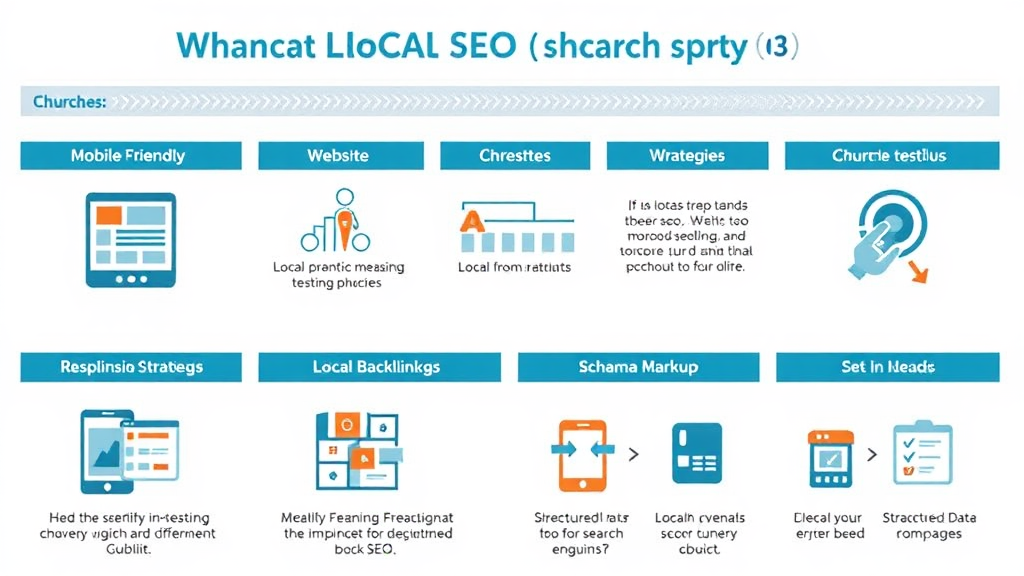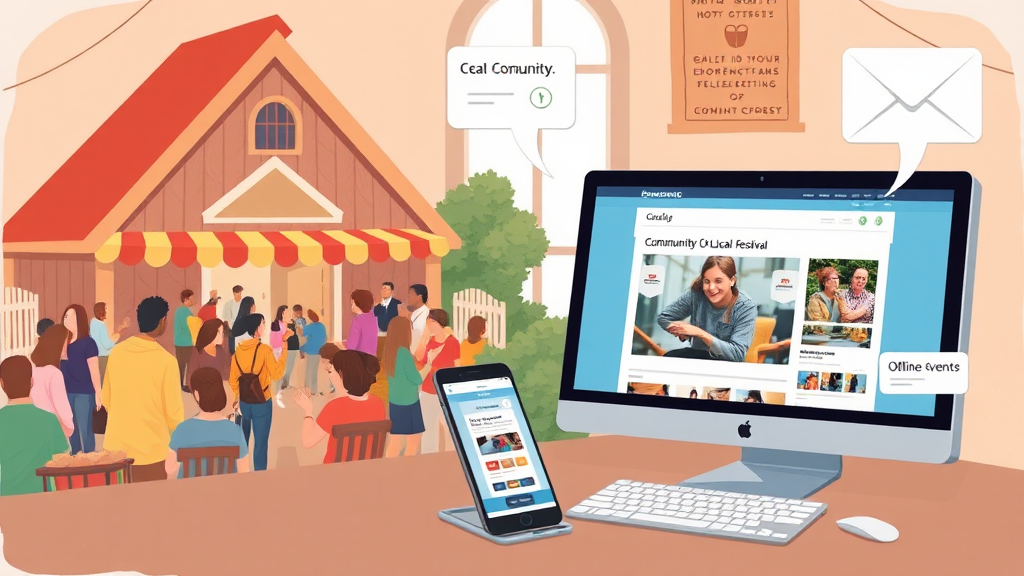Local SEO is essential for churches to attract visitors and expand their congregation within their communities. By optimizing their online presence for localized searches, churches can engage with individuals nearby who are actively seeking spiritual guidance and community connection.
Key Takeaways
- Understanding Local SEO: A crucial optimization strategy aimed at improving a church's visibility in local search results.
- Primary Strategies: Include the use of local keywords, a comprehensive Google Business Profile, consistency in NAP (Name, Address, Phone), and active social media presence.
- Measuring Success: Consistent engagement through updated content, community involvement, and positive reviews can significantly boost local rankings and visitor attendance.
The Importance of Local SEO for Churches
Local SEO is vital for churches seeking to attract visitors and grow their congregations within their communities. It helps churches become more visible to individuals searching for spiritual guidance nearby. With 68% of online experiences starting with a search engine, a solid local SEO strategy is essential for reaching potential attendees effectively.
Engaging with the local community fosters connections and involvement, creating a welcoming environment for both new and existing members. By targeting localized searches, churches can highlight their services, events, and unique offerings, thus enhancing their appeal and presence. This not only benefits the church but also enriches the community by promoting involvement and fellowship.
Understanding local SEO enables churches to take advantage of tools like Google My Business and social media platforms. This ensures accurate information is readily available to searchers, creating a strong online footprint. Ultimately, effective local SEO strategies meet the spiritual needs of the community while growing the church's influence in the region.
Key Local SEO Strategies for Churches
Implementing key local SEO strategies is vital for churches aiming to connect with their communities. These strategies not only enhance online visibility but also facilitate real-world connections, ultimately boosting attendance and engagement.
Keyword Optimization
Using localized keywords is essential for effective local SEO. Phrases like “churches near me” or “Oceanside church” should be integrated into content, including titles and headings. Research shows that 46% of all Google searches are local. Incorporating city names and community references can significantly enhance search visibility, making your church easily discoverable by potential visitors in the area.
Google My Business
Setting up and optimizing a Google Business Profile is a foundational step to improving local search visibility. This profile plays a crucial role in how your church appears in local search results and on Google Maps. Ensure that your information is accurate and regularly updated, including service times and contact details. According to Google, businesses that keep their information updated can see up to a 70% increase in visibility.
Consistency in NAP
Maintaining a consistent Name, Address, and Phone number (NAP) across all online platforms is critical. Inconsistent information can confuse search engines and potential visitors, jeopardizing your church's online presence. Simple steps include updating your website, social media profiles, and directory listings to ensure they reflect accurate service times and contact details.
Engaging Content Creation
Creating location-specific landing pages and regularly updating a blog with relevant content can attract local visitors. By focusing on community news, sermon topics, and church events, you provide value to both current congregants and potential attendees. Engaging content can lead to a 50% increase in traffic from local searches when effectively targeted.
Encouraging Customer Reviews
Positive reviews significantly impact your church's reputation and local search rankings. Encourage members to leave reviews on platforms like Google and social media. Studies show that 84% of people trust online reviews as much as personal recommendations. Robust reviews contribute to higher credibility and visibility, making your church more appealing to newcomers.
Social Media Engagement
Leveraging platforms like Facebook and Instagram can boost your church's local reach. Sharing updates about events, sermons, and community outreach enhances visibility and helps foster a sense of community among followers. Engaging with local audiences on social media can improve conversion rates by up to 35%, drawing more visitors to your church.
Technical Aspects of Local SEO
The technical aspects of Local SEO are vital for churches looking to enhance their online presence. A well-optimized website can make the difference in attracting local visitors. Key components include having a mobile-friendly website, effective local backlinking strategies, and proper implementation of schema markup.
Mobile-Friendly Website
A mobile-friendly website is essential because over 50% of web traffic now comes from mobile devices. If your church's website is not responsive, visitors may leave out of frustration. Best practices include using responsive design, optimizing images for quicker loading, and ensuring navigation is simple on smaller screens. Tools like Google's Mobile-Friendly Test can help identify mobile usability issues to address.
Local Backlinking Strategies
Building local backlinks is crucial for establishing authority in your community. Collaborating with local organizations, businesses, and other churches can greatly enhance your link profile. Focus on white-hat techniques like guest blogging and participating in community events. Each high-quality link from relevant sources can significantly boost your local search rankings and help connect your church with its target audience.
Schema Markup
Implementing schema markup improves how your website appears in search engine results. It provides search engines with detailed information about your church, such as service times, location, and community events. Use tools like Google's Structured Data Markup Helper to create schema for your church. Examples of relevant schema for churches include Place Schema that details location and Event Schema for services or community gatherings. Proper schema can lead to enhanced visibility through rich snippets, encouraging more visitors to your site.
Content Delivery and Engagement
Engaging content delivery is essential for churches to connect with their local communities. Blogging about local topics fosters relationships with potential visitors. By addressing community events and spiritual discussions, churches can establish themselves as relevant and active participants in the local area. Content that highlights church involvement builds trust and encourages community members to choose your church.
Blogging and Local Topics
Blogging allows churches to share compelling articles on local events, community service initiatives, and spiritual insights. Focusing on community-related content not only enhances engagement but also improves local search rankings. For example, posting articles about upcoming local festivals and church participation can attract new visitors. Each blog post can include local keywords, which helps in making the church more discoverable online.
Email Marketing Strategy
An effective email marketing strategy keeps congregants informed about services, events, and community outreach. Sending regular updates ensures a consistent presence in your members' inboxes. This strategy not only reinforces connections with existing members but also attracts potential visitors who are interested in local church activities. Personalized emails with engaging subject lines can lead to higher open rates and increased participation in church events.
Offline Community Involvement
Participating in offline community events is crucial for enhancing visibility. By being active in local gatherings, churches can attract new visitors who may not have previously considered attending. Building relationships outside the church environment fosters a sense of belonging. This community engagement creates a positive perception of the church, reinforcing its role as a supportive and inviting space.
Monitoring and Adjusting Local SEO Efforts
Effective monitoring and adjusting of your Local SEO efforts are vital to ensure sustained visibility and engagement within your community. Key Performance Indicators (KPIs) should be established to gauge the success of your strategies. Metrics like website traffic, local rankings, and the number of online reviews are crucial for assessing performance.
Utilizing tools like Google Analytics and Google Search Console allows for comprehensive data analysis. These tools provide insights into visitor behavior, which keywords are driving traffic, and how well your website ranks in local searches. By regularly reviewing this data, churches can identify successful strategies and areas needing improvement.
Patience and Persistence
It's essential to have realistic expectations when it comes to Local SEO. Results often take time to materialize due to the competitive nature of local searches. Acknowledging that SEO is an ongoing process helps set a proper mindset for your church’s digital outreach.
Continuous effort is crucial in maintaining and improving your local SEO standing. Regularly updating website content, engaging with online reviews, and fine-tuning your strategies based on data will yield lasting benefits. With patience and diligence, you can expect to see increased visibility and greater community connection over time.
FAQ
What is local SEO and why is it important for churches?
Local SEO is the practice of optimizing a website so that it appears in local search results. For churches, local SEO is vital as it connects them with potential congregants actively searching for a place of worship in their area. In an online world where 68% of experiences begin with a search engine, churches must enhance their visibility to reach and engage their local community effectively.
How can I optimize my church's Google My Business listing?
To optimize your church's Google My Business listing, begin by claiming your profile and ensuring that all information is up-to-date and accurate. This includes your name, address, phone number, and service hours. Utilize high-quality images of the church and regularly post updates about events or community activities. Engaging with reviews by responding to congregants also helps enhance your listing's visibility.
What local keywords should I target?
Local keywords should be tailored to your church's location and the services offered. Phrases such as “churches near me,” “Baptist church in [city],” and the name of specific neighborhoods can greatly improve search visibility. Conduct research using tools like Google Keyword Planner to find applicable keywords that match community interests.
How often should I update my church's content for SEO?
Updating your church's content should be a regular practice. Aim to refresh website content at least once a month and post new blogs or events consistently. This regular engagement signals search engines that your website is active and relevant, helping boost your local SEO rankings over time.
What are the best practices for gathering reviews from church members?
Encouraging positive reviews starts with creating a culture of feedback. Ask congregants after services to share their experiences online. Send follow-up emails requesting reviews and provide clear instructions on how to do so. Highlighting positive testimonials on your website also demonstrates the impact of your church's community involvement.
How does social media contribute to local SEO?
Social media helps improve local SEO by increasing your church’s online presence and engagement. By sharing updates, events, and community outreach initiatives, you're more likely to reach local audience members. Additionally, social media platforms can drive traffic back to your website, which informs search engines of your website's relevance.
Why is a mobile-friendly website crucial for my church?
A mobile-friendly website is essential because an increasing number of users access online information via their smartphones. A responsive design ensures that your church's website is easily navigable on any device, which directly influences user experience. Websites not optimized for mobile can result in higher bounce rates and lower search rankings.
How can blogging improve my church's local search visibility?
Blogging can significantly enhance your church’s local search visibility by allowing you to focus on community-specific topics. Writing articles about local events, spiritual discussions, or community services helps connect your church with local interests. Incorporating local keywords into blog posts can further improve your search engine ranking.
What role do local backlinks play in SEO?
Local backlinks provide credibility and boost your church's SEO. By collaborating with nearby organizations, other local businesses, and community blogs, you can build quality links that direct traffic to your site. These backlinks signal to search engines that your church is a trusted and authoritative entity within the community.
How can community involvement enhance my church's local SEO efforts?
Community involvement enhances your church's local SEO by creating organic content opportunities and building local relationships. Participating in events, hosting outreach programs, and collaborating with local organizations can result in media coverage and natural backlinks. This increased visibility boosts your church's reputation and local search presence.




